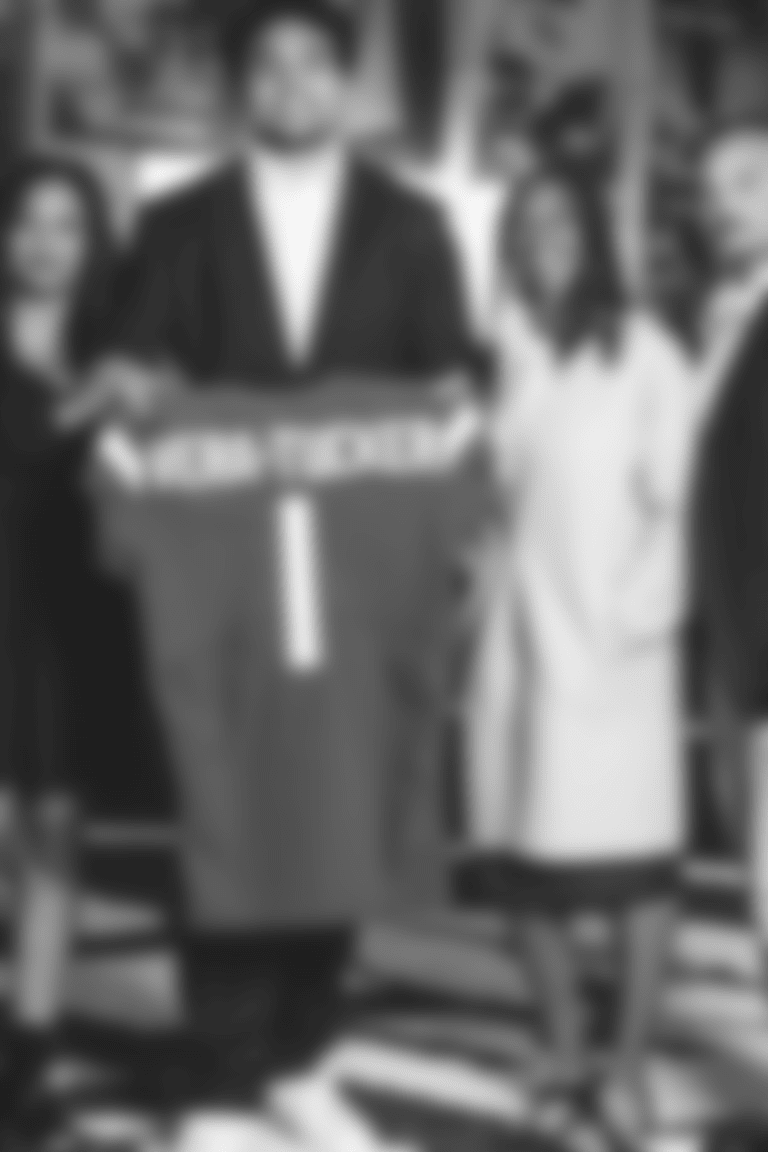What’s Your Why: Alijah-Vera Tucker
An In-Depth Interview with Jets Offensive Lineman
What's Your Why is an in-depth interview series to get to know the players at the New York Jets. OL Alijah Vera-Tucker sat down with team reporter Caroline Hendershot and discussed the importance of his family in his life, his success at USC, and his comebacks from two season-ending injuries.
Q&A with Alijah Vera-Tucker:
Caroline Hendershot: All right, Alijah, you were born and raised in Oakland, California. You have two sets of parents because your parents were married and then both remarried after the divorce. Do you remember what it was like when that happened? Did you initially not feel as happy about it as you are now?
Alijah Vera-Tucker: So they split at a young age, when I was young, so I don't remember it at all, and my mom met my stepdad when I was young and my dad with my stepmom as well. So, I just kind of grew up with them always being there. That's something I'm really blessed for, because they've always been in my life. I don't see my stepdad as my stepdad or stepmom as my stepmom. I mean, having four parents, there was definitely hurdles growing up, but I feel like my parents, all four of them, handled it really well in raising me into the young man, or the man I am today.
CH: You had the Vera household growing up, and then you had the Tucker household growing up. In high school, you started going by Alijah Vera-Tucker, and then in college, you made it official. Why was it so important to you to get both of your last names legally changed to one?
AVT: Like I said before, since a young age, just all I've known is being a part of the Vera family and Tucker family. So as soon as I was able to change that, when I got to college, turned 18, I did just because, I wanted to be closer to my family and just represent that last name on my back like I've always wanted to do.
CH: You come from a Mexican background as well. How much does it mean to you to be able to represent that Hispanic culture every Sunday on a national stage?
AVT: It's a rare opportunity. There's not a lot of us from Mexican heritage in the NFL, so being able to be one of those representatives I feel like holds a lot of weight. I'm proud to be one of them. Every year it's cool during the Heritage Month the NFL reaches out wanting you to do things and I'm all for it. Even the little things like putting the flag on the back of the helmet, I think that's really cool. It's cool to wear that helmet or the flag with pride.
CH: Would you say that motivation to perfect your craft comes from within because you don't get that outside attention as much just based on the position? Does it all come from just who you are?
AVT: Being a family guy, like I said before, and having two little sisters I kind of grew up just being a protective person overall. I think I could say that translated well into playing offensive lineman because obviously you protect the quarterback back there, you protect the running back, you block for the running back and you have to have good communication and work well with the other four guys on the offensive line. So, I think that does kind of stem from me being who I am and me naturally fitting in that position.
CH: So, you go to USC and it's not until your red shirt sophomore year where you get to start at left guard for all 13 games. You were an All-Pac 12 second team, AP All-Pac 12 first team and you were USC offensive lineman of the year. Why do you think you found so much success right from the jump?
AVT: I think for me it was patience, right? I feel like coming in, obviously I wanted to start, but didn't. Then, my second year I was getting reps here and there. So, I was like, okay, put my head down and work and make sure when I get my opportunity, I'm going to make the most of it. I think that kind of motivated me, not playing as much as I wanted to the first two years. I also had really good coaching from my coach in college, Tim Drevno. I give a lot of credit to him and the guys I was playing with. My center and my left tackle, both my roommates, so guys who I already hung out with every day. So, I wanted to play my heart out for those guys and the rest of the o-line.
CH: Your rookie season with the Jets, you start 13 games at left guard. Then, the next year, in 2022 the carousel comes. You play three games at right guard, then week four you play left tackle, then week five you play right tackle, and you continue to play right tackle for the next three games. I need people to understand how hard this is to do, because you did it so easily and made it seem like it was no big deal. But how hard is that? Not only to be that versatile, but play a new position almost every week?
AVT: It definitely is hard, for sure. I remember them asking me if I could play left tackle. I'm like, for real? Okay, I could do it but just give me some time and some practice. So, it felt a little rusty going from right guard to left tackle then to right tackle. I definitely took advantage of the practices to get myself prepared mentally and physically. I would say it is hard though, because when you go from right guard to left tackle, the footwork is different, the rushes are different, the run blocking is different. Then with right tackle, it's the same thing. Right tackle felt a little bit easier, but it was still pretty hard.
CH: Then in week 7 of 2022, you tear triceps in Denver against the Broncos. What was that like when that happened? Did you know right away?
AVT: I didn't know I had torn my triceps. It was the right one. I had pulled a muscle before, so that's what I kind of thought it was. My hope was I was going to be out for probably a month, month and a half, and I was going to get back to it. Unfortunately, the MRI came back and that was some devastating news for sure. That was my first season ending injury. I never had one of those before and mentally that was tough. Especially with how I was playing, I felt really good and felt really comfortable out there. That was hard, but it was definitely something that made me mentally stronger. It made me appreciate the game more.
CH: In 2023, you're starting at right guard, and then in week five you guys go back to Denver where your triceps injury occurred. What were you feeling heading into that game?
AVT: It was in the back of my head that I got injured here last year this and that, but I knew I was just going to go out there play my game. Once I was on the field, I had never thought about it, it was just like any other game and then unfortunately I pop my Achilles. I was like, 'no way, in Denver again? Around the same time?' Completely different injury, but mentally, that was hard on me as well.
CH: This group feels like the sky is the limit for them. What's the goal for you this year?
AVT: Goal for me? One, stay healthy and stay on that field. That's my main goal. Two, I would say play at a high level where it makes my right tackle's job easier and my center's job easier. Three, whatever accolades come with that I'll take, but I feel like the main thing for me always being someone who's played team sports, is getting to the playoffs and then getting to that final game as well.









